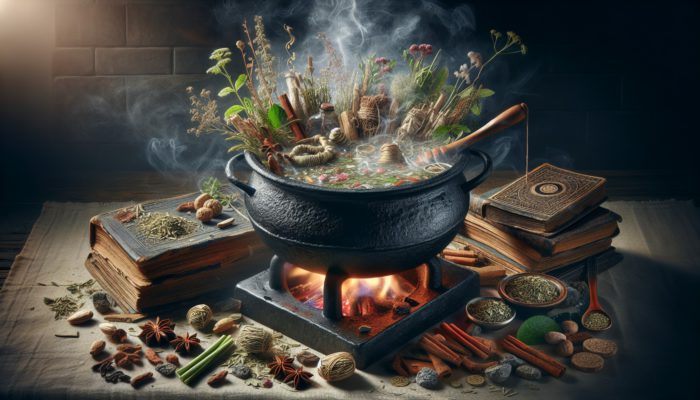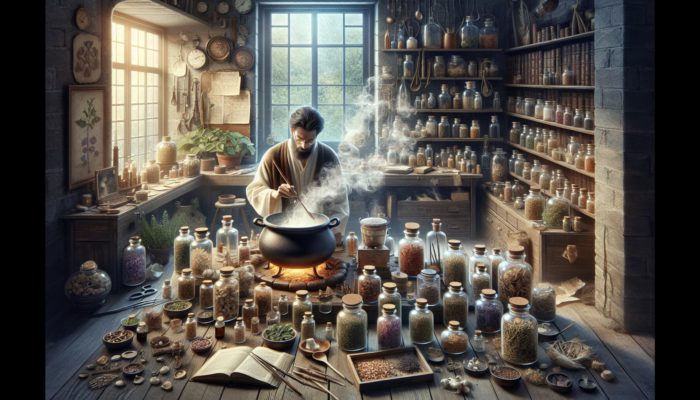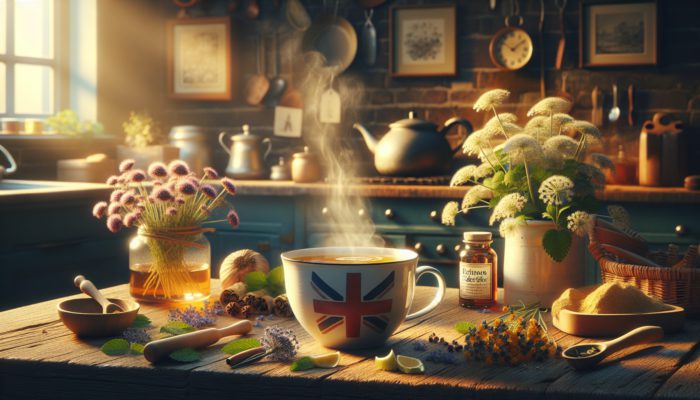Master the Art of Crafting Multi-Herb Decoctions for Optimal Health Enhancement
What Are Multi-Herb Decoctions and How Can They Benefit Your Health?

Multi-herb decoctions represent a sophisticated method of blending various herbs that are boiled in water, a process designed to extract their potent medicinal properties. This traditional preparation technique is foundational in the realm of natural medicine, enabling practitioners to tap into the active compounds found in an assortment of herbs to craft powerful remedies. The art of making a decoction involves a meticulous and prolonged simmering process, which is essential for ensuring that the beneficial attributes of the selected herbs are thoroughly released. In the UK, a diverse range of herbs is celebrated for their distinctive health advantages, making them ideal candidates for inclusion in these decoctions. Frequently used herbs encompass:
- Chamomile, renowned for its calming effects on both mental and physical well-being.
- Mint, effective in addressing digestive issues, thus enhancing gut health.
- Thyme, recognised for its robust antimicrobial properties, supporting respiratory health.
- Hawthorn, often recommended for promoting heart health and enhancing circulation.
- Rosemary, celebrated for its cognitive-enhancing attributes, particularly in terms of memory and focus.
- Elderflower, frequently utilised in remedies for colds and flu, bolstering respiratory wellness.
- Ginger, favoured for its potent anti-inflammatory properties, which contribute to overall wellness.
- Fennel, beneficial for alleviating bloating and gas, thus promoting digestive comfort.
By understanding the extensive variety of herbs at their disposal, practitioners can formulate customised decoctions that effectively target specific health issues, showcasing the remarkable versatility of herbal medicine.
Exploring the Rich Historical Significance of Multi-Herb Decoctions in the UK
The tradition of crafting multi-herb decoctions is deeply rooted in the rich historical context of the UK, intricately interwoven with British herbalism and folk medicine. Historical manuscripts and time-honoured herbal traditions have laid the groundwork for the contemporary application of these remedies, emphasising the healing properties of various botanicals. Influential historical figures have made significant contributions to herbal practices, including:
- Hildegard of Bingen, a medieval nun whose extensive writings on herbalism greatly influenced subsequent herbal practices.
- Nicholas Culpeper, a 17th-century apothecary whose publications democratized access to herbal medicine for the general public.
- John Gerard, the author of “The Herball,” a foundational text that remains a key reference in the study of herbs today.
- Mrs. Grieve, a 20th-century herbalist whose influential work continues to serve as a cherished resource for herbal practitioners.
These pioneering individuals underscored the importance of local plant life, illustrating how herbs native to the British Isles could be harnessed for their extraordinary healing potential. This historical framework not only enriches current practices but also revitalises interest in traditional remedies, as more individuals gravitate towards time-honoured methods for achieving wellness.
What Essential Precautions Should You Consider When Preparing Decoctions?
Safety stands as a paramount concern when preparing multi-herb decoctions, necessitating a careful assessment of potential herb interactions and appropriate dosages to prevent any adverse effects. Misusing herbs or employing incorrect dosages can lead to negative outcomes, making it vital for practitioners to stay informed and vigilant. Here are several critical safety measures to keep in mind:
- Consult a qualified practitioner before embarking on any herbal regimen, especially if you have pre-existing health conditions or are taking medications.
- Research Herb Interactions – comprehending how different herbs might interact is crucial for ensuring safety.
- Begin with Small Doses – gradually introduce herbs into your routine to assess your body's response and tolerance levels.
- Monitor for Side Effects – be vigilant for any adverse reactions and discontinue use if necessary.
By prioritising safety and adhering to informed practices, individuals can maximise the health benefits of multi-herb decoctions while minimising potential risks. Emphasising these precautions encourages a responsible approach to herbal remedies, ensuring they serve as supportive health tools rather than complicating health issues.
Effective Techniques for Mastering the Craft of Multi-Herb Decoctions

How Do Herbal Experts Choose the Most Effective Herbs for Decoctions?
Herbal medicine experts engage in a meticulous selection process when choosing herbs, taking into account their unique medicinal properties, compatibility, and the desired health outcomes. This selection process is a harmonious fusion of both art and science, integrating traditional knowledge with contemporary understanding. For example, a practitioner in the UK might opt for ginger due to its anti-inflammatory benefits and combine it with peppermint to enhance digestive health. The synergy produced by these herbs not only addresses multiple health issues but also elevates the flavour and overall effectiveness of the decoction.
In the UK, expert herb selection often draws from the rich tapestry of local flora and the cultural significance attributed to particular plants. For instance, nettle is frequently selected for its impressive nutritional profile, while dandelion is revered for its detoxifying effects. Experts also consider the specific needs of the individual patient, leveraging their experience to create tailored combinations for particular health concerns. This personalised approach ensures that the decoctions are not only potent but also meet the unique health requirements of each individual, thereby maximising their potential benefits.
What Techniques Do Experts Use for the Efficient Preparation of Decoctions?
Experts employ specific techniques in the preparation of decoctions that serve to maximise the efficacy of their herbal blends. A fundamental approach involves simmering the herbs rather than boiling them, which helps to preserve the delicate active compounds. A common guideline suggests simmering a carefully selected mix of herbs for 30 to 45 minutes, allowing ample time for extraction while preventing degradation of the beneficial components.
In the UK, practitioners may follow these actionable steps to effectively implement expert techniques:
1. Choose Quality Herbs: Always select fresh or dried herbs from trustworthy sources to ensure their potency.
2. Measure Accurately: Use precise measurements to balance the potency of the herbs, thereby enhancing the decoction's effectiveness.
3. Simmering Process: Bring water to a boil, then reduce to a simmer, adding the herbs and maintaining a low temperature to preserve their properties.
4. Strain Effectively: Employ a fine strainer or cheesecloth to eliminate solid herb particles, resulting in a smooth decoction.
5. Store Properly: Allow the decoction to cool before transferring it to a clean, airtight container, refrigerating it if not consumed immediately.
These expert techniques not only enhance the quality of the decoction but also ensure that the herbal combinations work synergistically, yielding the best possible health outcomes.
What Are the Recommended Herb Combinations by Experts for Maximum Efficacy?

Experts often recommend specific herb combinations and their respective ratios, tailored to address particular health conditions, relying on extensive research and practical experience. In the UK, a frequent recommendation includes a decoction of echinacea and elderflower to bolster the immune system, particularly during the colder months when colds and flu are prevalent. This combination harnesses the immune-boosting properties of echinacea while leveraging the soothing qualities of elderflower, resulting in a powerful natural remedy.
Another noteworthy suggestion involves using chamomile and lemon balm to alleviate stress and encourage relaxation. The calming attributes of both herbs make them an excellent choice for individuals grappling with anxiety. Experts emphasise the importance of experimenting with varying ratios, as the efficacy of each blend can fluctuate based on personal responses. For instance, starting with a ratio of 2:1 chamomile to lemon balm can be fine-tuned based on taste preferences and desired effects.
In addition to specific combinations, experts also advise considering seasonal variations. For example, during spring, incorporating nettle into decoctions can utilise its detoxifying properties, aligning with the body's natural rhythms as it transitions to warmer months. This dynamic approach not only underscores the adaptability of herbal medicine but also encourages practitioners to engage with their environment, fostering a deeper connection to local herbal traditions.
How Do Experts Ensure Safety When Preparing Herbal Decoctions?
Experts adhere to stringent safety protocols when crafting multi-herb decoctions, taking into account possible herb interactions and the individual needs of patients. Safety is a top priority in herbal medicine, ensuring that remedies do not lead to adverse reactions. Practitioners typically begin by conducting thorough assessments of their patients, considering any pre-existing health conditions, allergies, or medications that may interact with the herbs.
In the UK, expert safety measures encompass:
1. Comprehensive Consultations: Engaging in detailed discussions with patients to fully understand their medical history and current health status.
2. Researching Interactions: Staying abreast of the latest research concerning herb interactions, particularly in relation to commonly prescribed medications.
3. Educating Patients: Providing clear guidance on recognising signs of potential side effects and encouraging patients to monitor their reactions to the decoctions closely.
4. Utilising Trusted Sources: Sourcing herbs from reputable suppliers to ensure they meet safety standards and are free from contaminants.
By implementing these safety measures, experts cultivate trust with their patients and advocate for a responsible approach to herbal remedies. This diligence not only safeguards health but also enhances the reputation of herbal practices as reliable and effective components of holistic wellness.
Steps to Create Multi-Herb Decoctions in Your Own Kitchen
What Essential Tools Do You Need for Crafting Decoctions at Home?
To successfully create multi-herb decoctions in the comfort of your home, you’ll require some basic kitchen tools that are both accessible and user-friendly. Having the right equipment can significantly streamline the decoction-making process, ensuring efficiency and effectiveness. At the very least, you will need:
1. Pot: A medium-sized pot for boiling water and herbs is essential. Opt for a heavy-bottomed pot to prevent scorching and ensure even heating.
2. Strainer: A fine mesh strainer or cheesecloth is crucial for separating the liquid from solid herb materials after the simmering phase.
3. Measuring Tools: Accurate measuring cups or scales are essential for ensuring that the correct herb ratios are utilised, thereby enhancing consistency and potency.
4. Storage Containers: Airtight glass jars or bottles are ideal for storing your decoctions, as they help maintain freshness and efficacy.
5. Stirring Utensils: A wooden spoon or silicone spatula is useful for stirring the herbs during the simmering process.
With these essential tools at your disposal, you can confidently engage in the craft of creating herbal decoctions. Each piece of equipment plays a pivotal role in ensuring a smooth decoction process that yields beneficial results for your health.
Which Herbs Are Best Suited for Your Decoctions?
Selecting the appropriate herbs is vital for producing effective decoctions, as their medicinal properties and compatibility can greatly influence the final product. In UK households, several herbs are commonly selected for their therapeutic attributes, enabling families to create remedies tailored to their specific needs. Some popular choices include:
1. Elderflower: Frequently used for its anti-inflammatory and immune-boosting properties, making it a preferred choice for combating colds.
2. Nettle: Rich in nutrients and celebrated for its detoxifying effects, nettle is ideal for addressing seasonal allergies and promoting overall vitality.
3. Peppermint: Valued for its digestive benefits, peppermint can soothe upset stomachs and encourage relaxation.
4. Lemon Balm: Known for its calming effects, lemon balm is excellent for alleviating stress and anxiety.
5. Thyme: Utilised for its antimicrobial properties, thyme serves as a strong ally in supporting respiratory health.
When selecting herbs, consider the specific health benefits you wish to achieve and how the flavours will complement one another. For instance, pairing ginger with lemon balm creates an invigorating yet soothing decoction, perfect for a calming evening ritual. Experimenting with diverse combinations can lead to personalised remedies that align with both your palate and health needs.
How Long Should You Simmer Your Decoction for Optimal Results?
The simmering duration for decoctions can vary based on the herbs selected and the desired potency of the final product, typically ranging from 20 to 60 minutes. The simmering process is crucial, as it enables the active compounds in the herbs to infuse into the water, resulting in a potent herbal remedy. To determine the appropriate simmering time, consider the following factors:
1. Herb Type: Harder herbs, such as roots and barks, often require longer simmering times, whereas softer herbs like leaves and flowers may be ready in a shorter timeframe. For example, ginger root may necessitate 40–60 minutes, while chamomile flowers might only require 20–30 minutes.
2. Desired Strength: If you prefer a more concentrated decoction, extend the simmering time accordingly. Conversely, for lighter flavours, shorter simmering will suffice.
3. Personal Preference: Individual taste preferences play a significant role; some people enjoy stronger, richer flavours, while others may prefer more subtle notes.
To achieve optimal results, start with the recommended simmering times for your selected herbs and adjust them based on your personal experiences. Always taste the decoction as it simmers; this practice helps ensure you achieve the desired flavour and potency before straining and serving.
Uncovering the Health Benefits of Multi-Herb Decoctions in the UK
What Health Advantages Can You Expect from Multi-Herb Decoctions?
Multi-herb decoctions can provide relief from a myriad of ailments, including digestive issues, respiratory complications, and stress management. Their synergistic properties promote a holistic approach to health and wellness. For instance, a decoction combining ginger and peppermint can effectively ease digestive discomfort, addressing both nausea and bloating.
In the UK, specific conditions that these decoctions can assist with include:
1. Colds and Flu: Herbal combinations featuring elderflower, echinacea, and thyme can bolster the immune system and alleviate respiratory symptoms.
2. Digestive Disorders: Decoctions containing peppermint and fennel are frequently employed to relieve gas, bloating, and cramping.
3. Stress and Anxiety: Blends of chamomile, lemon balm, and lavender can foster relaxation and enhance sleep quality.
4. Inflammation: Combining turmeric and ginger can provide significant anti-inflammatory effects, particularly beneficial for conditions like arthritis.
By harnessing the combined power of multiple herbs, these decoctions offer a holistic approach to health, effectively addressing a wide array of symptoms in a single drink. This versatility makes them an invaluable addition to any wellness routine, particularly for those seeking natural remedies in the UK.
How Do Multi-Herb Decoctions Enhance Overall Well-being?
Regular consumption of multi-herb decoctions can significantly elevate overall well-being by fortifying the immune system and promoting relaxation. The combined benefits of various herbs can lead to improved physical and mental health, rendering these decoctions an essential component of a balanced lifestyle. For example, a daily decoction of nettle and ginger not only supports immune function but also serves as a rich source of vital nutrients, contributing to overall vitality and energy.
Moreover, research indicates that herbal remedies can positively influence stress levels. The soothing characteristics of herbs such as chamomile and lemon balm can assist individuals in managing daily pressures, fostering a sense of calm and mental clarity. Incorporating these decoctions into your daily routine can serve as a natural method for combating stress, enhancing emotional resilience, and promoting overall mental health.
In the UK, a growing number of individuals are rediscovering the value of herbal remedies as a means of supporting their well-being. The ritual of brewing a decoction evolves into a mindful practice, allowing individuals to connect with nature and their health on a deeper level. This connection becomes invaluable in our fast-paced world, offering an opportunity for individuals to pause, reflect, and nurture their well-being.
What Cultural Significance Do Multi-Herb Decoctions Hold?
Within the UK, multi-herb decoctions possess considerable cultural significance, often intertwined with traditional remedies and cherished family recipes. These herbal mixtures have been handed down through generations, embodying a wealth of knowledge and practices. Many households rely on beloved recipes, crafted from local herbs, to tackle common health issues. For example, a family might prepare a traditional elderflower and lemon balm decoction to address colds, a recipe that connects them to their heritage.
Furthermore, herbal remedies are frequently linked with seasonal customs. For instance, in various regions, nettles are harvested in spring, and decoctions made from these nutrient-rich plants are used to promote detoxification and vitality as the seasons shift. This cyclical relationship with herbs fosters a sense of community and connection to the land, reminding individuals of nature's power.
Cultural events and festivals, such as herbal fairs, celebrate the art of crafting herbal remedies, providing opportunities for individuals to learn about traditional practices and explore the benefits of various herbs. Through these gatherings, knowledge is exchanged, and the significance of herbs in the UK’s cultural landscape is acknowledged, ensuring that the tradition of crafting multi-herb decoctions continues to thrive.
Scientific Evidence Supporting the Benefits of Multi-Herb Decoctions
What Does Current Research Indicate About Multi-Herb Decoctions?
A growing body of research substantiates the effectiveness of multi-herb decoctions in addressing various health conditions, validating their role within modern medicine. Studies suggest that the synergistic effects resulting from the combination of herbs can amplify their individual benefits, leading to enhanced health outcomes. For example, research focusing on the combination of echinacea and elderflower has uncovered significant immune-boosting properties, particularly during the cold and flu season.
In the UK, specific studies have explored the impact of traditional herbal mixtures on health. Findings suggest that decoctions made with local herbs can not only provide symptom relief but also improve overall health markers. This evidence supports the increasing interest in herbal medicine, motivating individuals to incorporate these remedies into their wellness routines.
Additionally, the expanding body of scientific literature plays a vital role in demystifying herbal practices, bridging the gap between ancient wisdom and contemporary health methodologies. As more studies emerge, practitioners can confidently guide patients in the use of multi-herb decoctions, ensuring that herbal remedies are recognised as a vital component of modern healthcare.
How Do Multi-Herb Decoctions Compare to Single-Herb Preparations?
Research demonstrates that multi-herb decoctions can offer synergistic effects, providing more comprehensive benefits compared to single-herb preparations. The interactions among different herbs can create a harmonious balance, resulting in enhanced therapeutic effects. For instance, combining ginger, turmeric, and black pepper in a decoction not only harnesses the anti-inflammatory properties of each but also improves absorption, maximising their effectiveness.
In the UK, practitioners have observed that patients frequently report more significant health improvements when utilising multi-herb blends compared to single-herb preparations. This is particularly evident in digestive health, where combinations such as peppermint and fennel can address a broader spectrum of symptoms than either herb alone. The blending of multiple herbs allows for a more tailored approach, targeting several health concerns within a single remedy.
Moreover, multi-herb decoctions diversify the intake of beneficial compounds. By consuming a variety of herbs, individuals expose themselves to a broader array of active ingredients that contribute to their overall health and wellness. This holistic approach aligns seamlessly with modern health philosophies, emphasising the significance of variety and balance in nutrition.
What Active Compounds Are Found in Multi-Herb Decoctions?
The active compounds present in multi-herb decoctions encompass flavonoids, alkaloids, and essential oils, each playing a crucial role in their therapeutic effects. The richness of these compounds is what underpins the effectiveness of herbal remedies for a variety of health conditions. For instance, flavonoids found in herbs such as chamomile and sage are recognised for their anti-inflammatory and antioxidant benefits. Meanwhile, alkaloids found in herbs like ginger can assist in digestion and alleviate nausea.
In the UK, specific compounds are frequently investigated for their health advantages. For example, rosemary contains rosmarinic acid, an antioxidant known for its role in supporting cognitive function, while thyme includes thymol, which exhibits notable antimicrobial properties. By understanding these active compounds, practitioners can select herbs that align with specific health objectives, thereby maximising the efficacy of their decoctions.
Furthermore, the extraction process is critical in determining the availability of these compounds. By employing the decoction method, practitioners ensure a higher concentration of these beneficial elements is extracted, making the remedy more potent. This focus on active ingredients underscores the importance of quality and preparation methods in crafting effective multi-herb decoctions.
Incorporating Multi-Herb Decoctions into Your Daily Routine
What Are the Optimal Times to Enjoy Your Decoctions?
The best times for consuming multi-herb decoctions can vary based on the herbs used and the intended health benefits. Generally, the timing of consumption can significantly influence the remedy's effectiveness. For instance, digestive herb blends like peppermint and fennel are ideally taken after meals to aid digestion. Conversely, calming decoctions containing chamomile and lemon balm are best enjoyed in the evening to promote relaxation and facilitate restful sleep.
When determining the most suitable times to drink your decoctions, consider the following:
1. Health Goals: Align the timing with your health objectives for optimal benefits. For example, if using a decoction for immune support, consuming it in the morning can help prepare your body for the day ahead.
2. Personal Routine: Incorporate decoctions into your daily habits, making them a regular part of your morning or evening routines.
3. Seasonal Considerations: During colder months, consuming warming decoctions in the morning can help bolster your immune system against seasonal ailments.
By strategically timing your consumption, you can enhance the benefits of multi-herb decoctions, ensuring they fit seamlessly into your daily wellness regimen.
What Are the Best Practices for Storing Your Decoctions?
Proper storage of multi-herb decoctions is crucial for maintaining their potency and typically necessitates refrigeration or freezing. The effectiveness of herbal remedies can diminish over time, particularly if not stored correctly. Here are some effective storage methods to consider in the UK:
1. Refrigeration: Store the decoction in an airtight glass container and refrigerate. This method can extend the shelf life to approximately 3-5 days.
2. Freezing: For long-term storage, pour the decoction into ice cube trays and freeze. Once frozen, transfer the cubes to a zip-top bag for convenient use in future recipes.
3. Avoid Light and Heat: Always store in a cool, dark place to protect the decoction from light exposure, which can degrade active compounds.
By adhering to these storage guidelines, you can ensure that your multi-herb decoctions remain fresh and effective, delivering the health benefits you seek. Regularly check for any changes in colour or smell, which may indicate spoilage.
What Are Some Innovative Ways to Utilise Multi-Herb Decoctions?
Beyond simply drinking them, multi-herb decoctions can be creatively employed in culinary applications, as topical treatments, or in baths for added health benefits. Their versatility opens up numerous applications, enriching both culinary and wellness practices. In the UK, consider these innovative uses for your decoctions:
1. Culinary Uses: Incorporate cooled decoctions into soups, sauces, or stews for enhanced flavour and health benefits. For example, a ginger and thyme decoction can elevate the taste of a broth while supporting immune health.
2. Topical Applications: Use cooled decoctions as herbal washes for skincare or hair treatments. Chamomile decoction can soothe irritated skin, while nettle can nourish hair.
3. Bath Soaks: Add decoctions to your bathwater for their soothing properties. A relaxing chamomile and lavender soak can promote tranquillity after a hectic day.
4. Homemade Remedies: Combine decoctions with honey or lemon for cough syrups or throat soothers, crafting natural remedies that harness the benefits of herbs.
These creative applications not only expand the potential benefits of multi-herb decoctions but also integrate them into daily life, enhancing overall health and enjoyment.
Reliable Strategies for Crafting High-Quality Multi-Herb Decoctions
How Can You Ensure the Quality of Your Decoctions?
Ensuring the quality of multi-herb decoctions involves sourcing high-quality herbs and adhering to precise preparation methods. The quality of the ingredients used heavily influences the effectiveness of herbal remedies. In the UK, implementing best practices for quality control includes:
1. Sourcing from Reputable Suppliers: Purchase herbs from established herbalists, organic markets, or local farms to guarantee freshness and potency.
2. Freshness Checks: Always utilise fresh herbs whenever possible. Check expiry dates on dried herbs and avoid those that are discoloured or lack aroma.
3. Proper Handling: Store herbs in a cool, dry place, away from sunlight, to preserve their properties and prevent spoilage.
4. Quality Control in Preparation: Maintain cleanliness throughout the preparation process, ensuring all equipment is sanitised to prevent contamination.
By following these quality control measures, you can confidently craft multi-herb decoctions that deliver optimal health benefits, reinforcing the significance of quality in herbal practices.
What Time-Tested Methods Enhance Decoction Crafting?
Time-tested methods for crafting multi-herb decoctions involve specific herb combinations and preparation techniques that have proven effective over the years. In the UK, traditional methods are often passed down through generations, emphasising the art of decoction. Key elements to consider include:
1. Traditional Recipes: Utilise established recipes that have demonstrated efficacy over time, such as a traditional cold remedy involving elderflower, ginger, and lemon.
2. Consistent Herb Ratios: Maintain consistent ratios of herbs, gradually experimenting to find the right balance for your specific health concerns.
3. Simmering Techniques: Adopt tried-and-true simmering techniques to enhance extraction, such as starting with cold water and slowly bringing it to a simmer to maximise compound release.
4. Community Wisdom: Engage with local herbalists or attend workshops to learn from experienced practitioners, gaining insights into effective methods and combinations.
These proven methods enhance the reliability and effectiveness of your multi-herb decoctions, allowing you to replicate successful blends and gain confidence in your herbal practice.
How Can You Tailor Your Decoctions to Individual Needs?
Customising multi-herb decoctions involves adjusting herb ratios and incorporating complementary ingredients based on individual health needs. This approach allows you to tailor remedies for specific conditions or preferences, creating a unique experience. Consider these strategies for personalisation in the UK:
1. Assess Individual Needs: Evaluate your health objectives—whether to alleviate stress, boost immunity, or support digestion—and select herbs that align with these goals.
2. Experiment with Flavours: Modify herb ratios to achieve the desired taste, ensuring that the decoction is enjoyable to consume. For example, if a blend proves too strong, balance it with sweeter herbs like liquorice.
3. Additional Ingredients: Enhance decoctions with other beneficial ingredients such as honey, lemon, or cinnamon for added flavour and health advantages.
4. Document Your Adjustments: Maintain a journal of your experiments, noting successful blends and their effects, which can help refine your personal approach over time.
By embracing this personalisation technique, you not only create remedies suited to your tastes and health needs but also foster a deeper connection to the herbal practice.
What Legal Aspects Should You Consider When Selling Decoctions?
Understanding the legal requirements for preparing and selling multi-herb decoctions in the UK is essential for compliance and safety. While crafting decoctions for personal use typically does not require legal oversight, selling these products necessitates adherence to specific regulations. Key considerations include:
1. Herbal Medicines Regulation: Familiarise yourself with the UK’s Herbal Medicines Regulation, which governs the sale of herbal products, ensuring they meet safety and quality standards.
2. Registration with Authorities: If you intend to sell herbal decoctions, consider registering with the appropriate health authorities and following guidelines for labelling and safety.
3. Compliance with Good Manufacturing Practices (GMP): Ensure that the production process meets GMP standards to guarantee quality and safety in your herbal products.
4. Consumer Safety: Be transparent about ingredients and potential allergens, providing clear information to consumers to prevent adverse effects.
By navigating these legal considerations, individuals can confidently prepare and sell multi-herb decoctions, thereby fostering trust and safety in their herbal practices.
Answers to Common Questions About Multi-Herb Decoctions
What are multi-herb decoctions?
Multi-herb decoctions are herbal mixtures that are boiled in water to extract their medicinal properties, widely used in traditional medicine for a range of health benefits.
What are some common herbs utilised in UK decoctions?
Common herbs used in the UK include chamomile, mint, thyme, hawthorn, rosemary, elderflower, ginger, and fennel.
How do I select the right herbs for my decoction?
Choose herbs based on their medicinal properties, the desired health outcomes, and their compatibility with one another, considering personal health needs and taste preferences.
What equipment do I need to make decoctions at home?
Essential equipment includes a pot, strainer, measuring tools, storage containers, and stirring utensils to ensure a smooth preparation process.
How long should I simmer my decoction?
Simmering time generally ranges from 20 to 60 minutes, depending on the herbs used and the desired strength of the decoction.
What health benefits are associated with multi-herb decoctions?
Multi-herb decoctions can alleviate various ailments, including digestive issues, respiratory complications, and stress, while also supporting overall well-being.
Can I incorporate decoctions into my cooking?
Yes, cooled decoctions can be used in soups, sauces, and stews to enhance flavour and provide health benefits.
How should I store my multi-herb decoctions?
Store decoctions in airtight glass containers in the refrigerator for 3 to 5 days, or freeze them in ice cube trays for longer-term use.
How can I personalise my decoctions?
Personalise your decoctions by adjusting herb ratios, adding complementary ingredients, and considering your specific health needs and taste preferences.
What legal considerations should I be aware of when selling decoctions?
Understand the Herbal Medicines Regulation in the UK, ensure compliance with good manufacturing practices, and be transparent about ingredients and potential allergens when selling herbal products.
Connect with us on Facebook!
The Article: Crafting Multi-Herb Decoctions: UK Guide appeared first on https://mtherapies.co.uk
The Article Multi-Herb Decoctions: A Guide for the UK Was Found On https://limitsofstrategy.com

